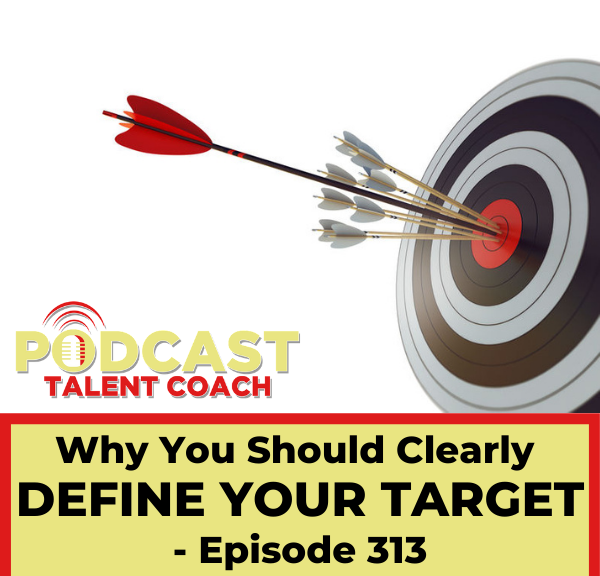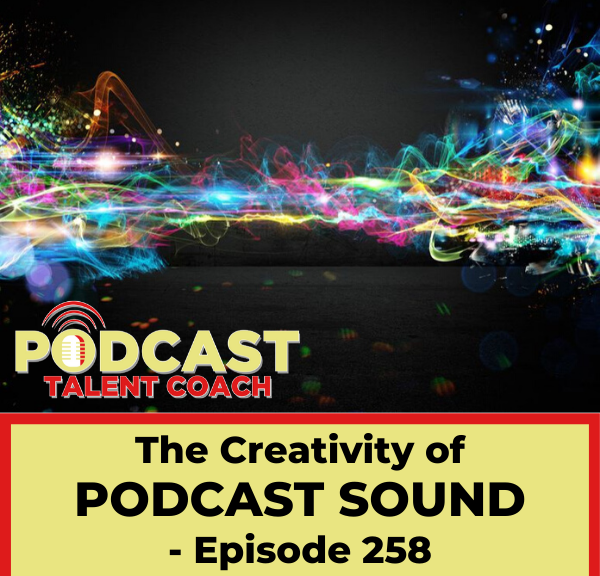Podcast: Play in new window | Download
Subscribe: RSS
There are many reasons why you need to clearly define your target listener. Today, I want to show you six really important reasons you should be able to visualize that ideal target listener before you ever begin recording an episode.
Last week we discussed your 2021 podcast roadmap. That is the foundation for these next few episodes. If you haven’t listened to that show, I would suggest you start there.
This series of episodes will help you create big things in the coming year if you take action and do the things I’m putting in front of you.
To help you clearly define your ideal target listener, download my Listener Development worksheet. www.PodcastTalentCoach.com/listener.
This tool will help you be able to visualize that single individual you are talking with on every episode. You content will be much more powerful and connect in a deeper way.
FIND THEM
By clearly defining your ideal target listener, you know where to find them. This is the first benefit.
When you are trying to grow your audience, you need to get in front of people who are not aware of you and your show. You need to let them get to know you. Then, you need to invite them to listen.
It is difficult to get in front of the right people if you don’t know who they are.
Imagine if I wanted you to market a new vehicle that has been developed by a new auto company. How would you begin to market it?
I believe you would begin by trying to figure out the typical driver of a vehicle like this. That driver would be different if it was a pickup truck or high end sports car or an entry level sedan.
Marketing for a Porche Carrera would be much different than advertising for a Ford Fusion. You would look for those ideal customers in different places.
The same is true for your podcast. Know your audience, so you can find them.
HELP THEM
By knowing your ideal target listener, you know how to help them. When you clearly define your listener, you know exactly where they struggle and how you can help them solve those problems.
If you are in the finance niche, the financial problems of a 23-year-old just out of college are probably much different than the problems of a 58-year-old empty nester.
When you can speak directly to those problems, your content becomes much stronger and more powerful. It is like you are reading my mind.
Now you can attract those people to your podcast and offer them additional help with your products and services.
You can’t help everyone. You want to help the right people.
RESULTS
That brings us to the third benefit of defining your ideal target listener. When you know exactly who you are speaking to, you know you can get them results.
If you help people with an online business for instance, you need to decide where they are in the life cycle of that business. Are you helping people who are just starting and trying to make their first dollar? Or, are you helping people who are making $100,000 per year and are trying to scale to $1 million?
Those are much different conversations. When coaches and information experts already have a podcast and have produced at least 25 episodes, I know I can help them grow their audience and drive their business. I’ve done it and know it works.
Does that mean my content isn’t helpful for brand new podcasters or those who do it as a hobby? Not at all. The info is still helpful. But, it is most helpful for those information experts like coaches and speakers who are ready to take it up a notch.
Define your ideal target listener based on who you know you can help.
CONTENT
The fourth benefit of defining your ideal target listener is your content filter. When you know your listener, you know what content they want.
Creating content every week for your show becomes easy when you have defined your listener. You have determined their wants, needs, fears and goals. You know their struggles and problems.
Speaking directly to those areas each week becomes so much easier when you have them defined. Again, your content is much more powerful.
As we discussed earlier, if you are in the finance niche, the financial problems of a 23-year-old just out of college are probably much different than the problems of a 58-year-old empty nester. The same is true for their goals, fears and wants.
You can create a content calendar all around these areas when you have clearly defined your listener.
When you don’t have a clear picture, you start saying things like, “If you’re new, you should do A. But if you’ve been doing it for awhile, you should do B.” Now you are trying to be all things to all people. In reality, you’re serving no one well.
Pick a target so you can hit it with solid content.
CONTEXT
Once you have the content, you need the context. This is the fifth benefit of defining your ideal target listener.
With a clear definition of your ideal target listener, you understand the context in which your content needs to be presented.
I often hear the big internet marketing gurus talk about going to a conference in the Philippines or when they were at their $100,000 mastermind that only meets twice a year at Expert X’s beach house in the Bahama’s.
Those are people who either don’t understand their target audience or their target audience is other big time gurus and not renegades like us. The context is all wrong for people trying to find their way and make their first dollar online.
The first dollar people want to hear from the husband and wife who did it around their passion and have the message of “you can, too.” That is context.
If I know you are trying to create a side hustle around your podcast, I can’t talk about flying to New York and spending ten thousand dollars to do a 30-minute interview with some famous person. It is the wrong context.
Know your ideal listener, so you can create the right context.
STORIES
Finally, when you know your ideal target listener, you know how to frame your stories.
Stories allow your listener to get to know, like and trust you. Through your stories, you listener will know what you believe and value. You trust them with details of your life. They trust you in return.
When your stories elicit that “me, too” response from your listener, they stir emotion. That’s powerful.
In his book Storyworthy, Matthew Dicks teaches the art of storytelling. Matthew is a professional storyteller who has competes in and wins the Moth StorySLAM. These are open-mic storytelling competitions. He is fantastic at telling stories.
Matthew has died twice in his life and had to be brought back to life. He has stories he tells about these two instances. However, neither story is about dying.
One story in particular talks about how his parents don’t come to the hospital immediately after the crash. Instead, they check on the car first. He feels all alone. He then realizes all of his friends have come to the hospital to ensure he is ok and provide their support, and that is the best gift anyone could receive.
Matthew says the story isn’t about dying, because the audience would never say, “Oh yeah, I remember the time I died too.” That doesn’t happen.
Instead, the story is about feeling all alone in the world and then his friends supporting him when he least expects it. Listeners are much more likely to say, “Yeah, I’ve been there. I’ve felt all alone before.”
That is the power of knowing your audience and framing your stories. The fact that his heart stops catches your attention. But loneliness and friendship stir the real emotion in his listeners.
GET STARTED
There they are. Six reasons you really, really need to define your ideal target listener before you record your next episode. Know as much about that person as you possibly can.
If you haven’t listened to episode 312 from last week, go check it out. We talk about your 2021 podcast roadmap.
This series of episodes will help you create big things in the coming year if you take action and do the things I’m putting in front of you.
To help you clearly define your ideal target listener, download my Listener Development worksheet. www.PodcastTalentCoach.com/listener.
Let’s turn your information into engaging entertainment.


